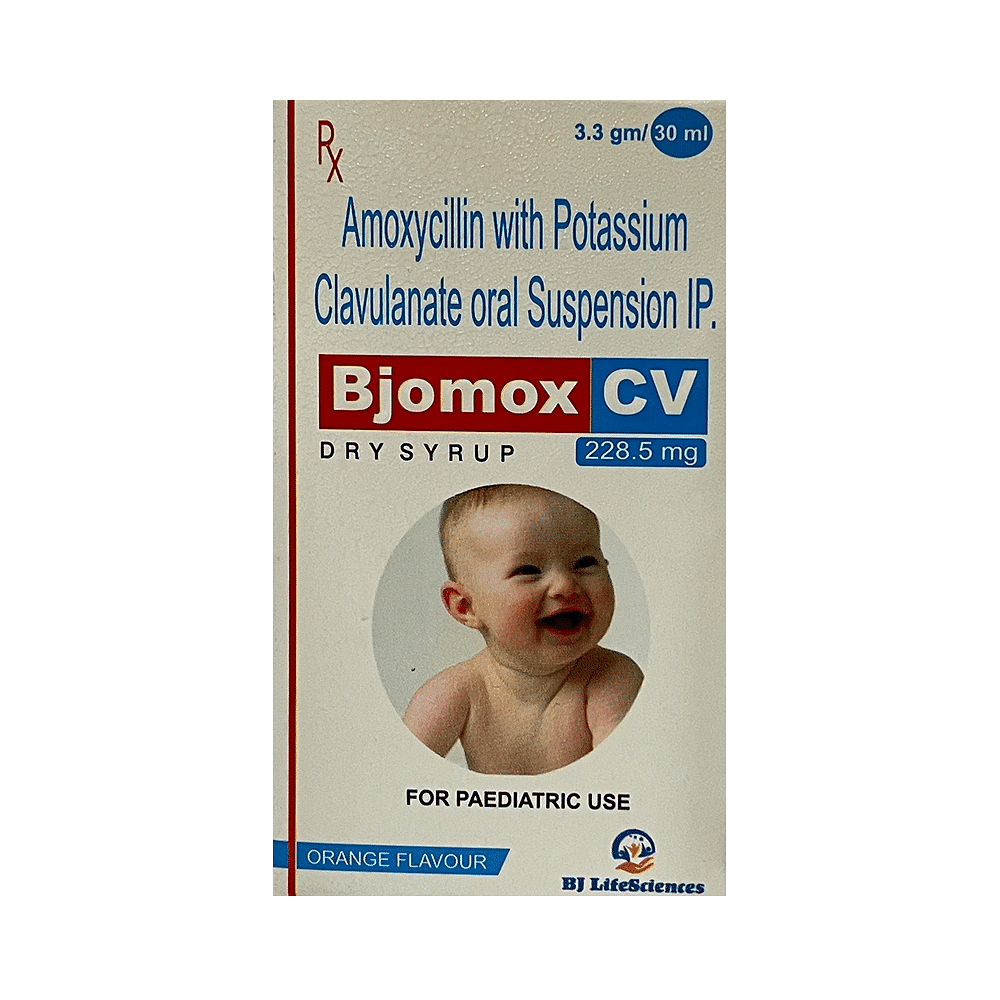
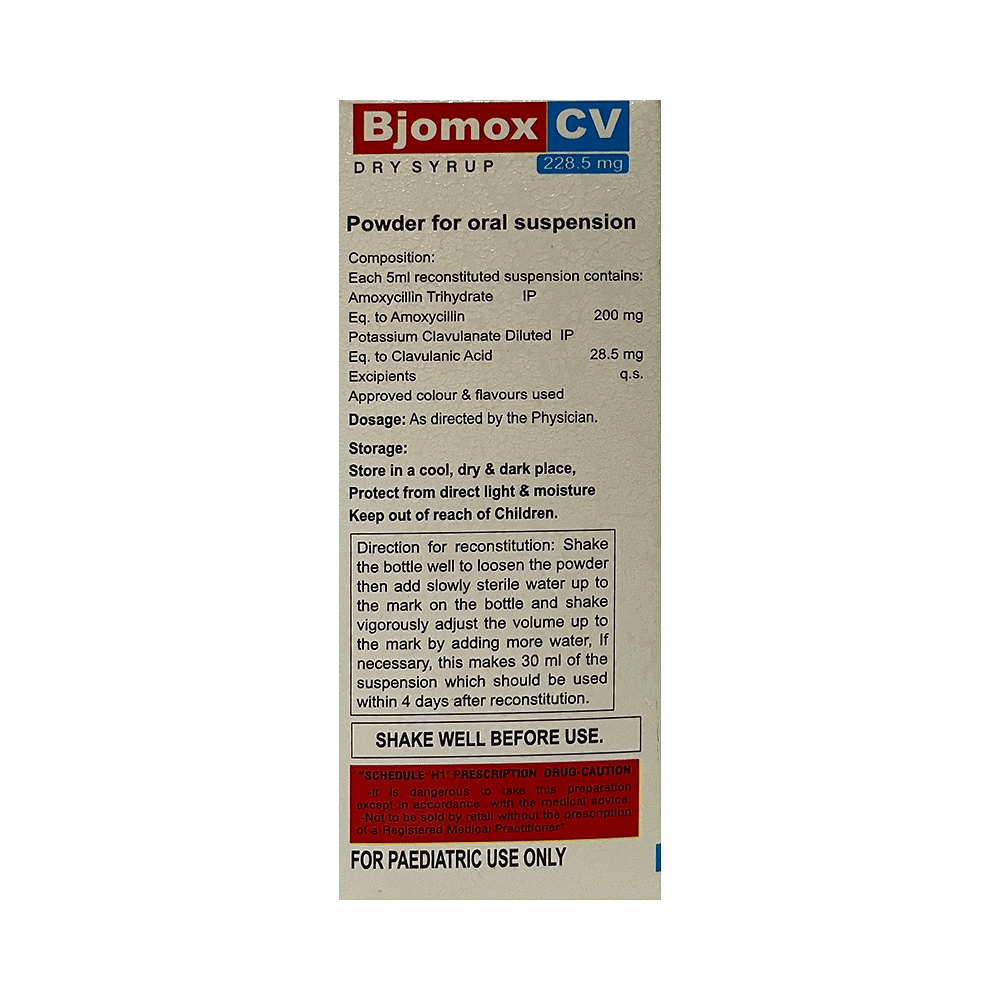
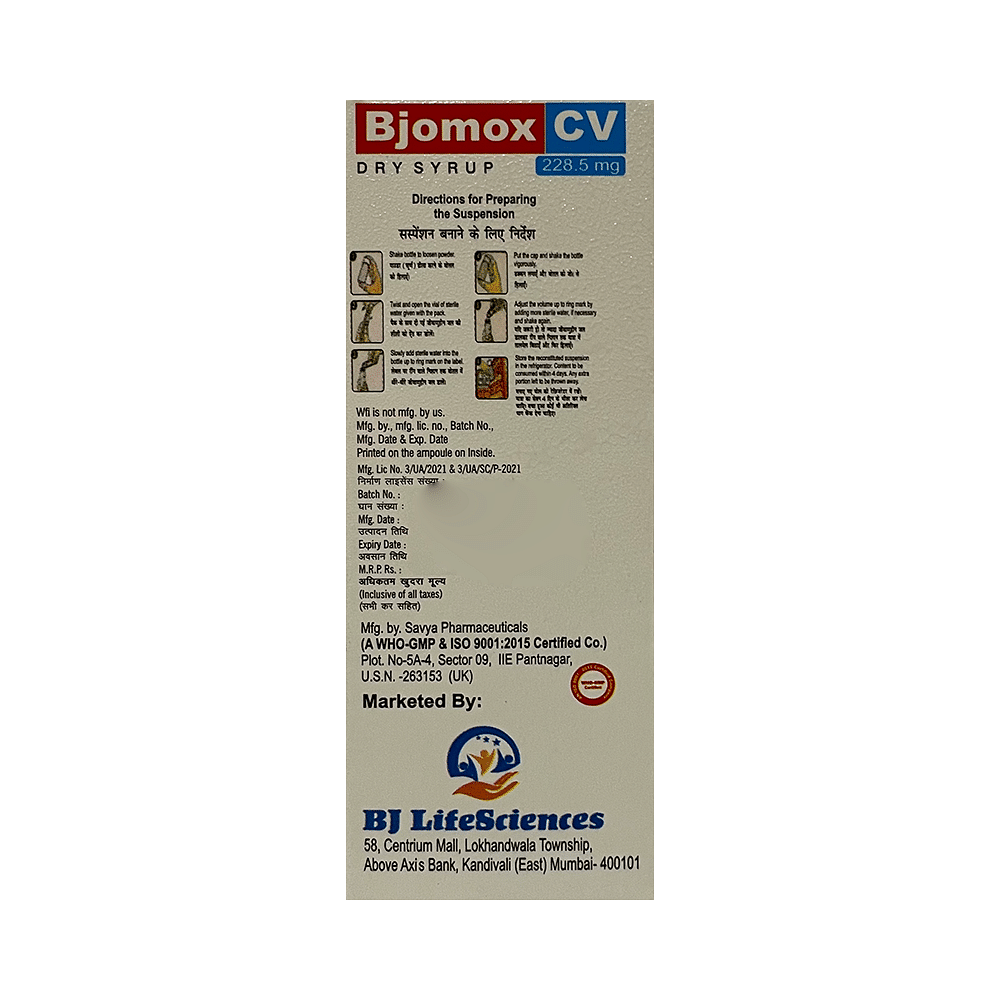
Bjomox CV 228.5 Dry Syrup
Manufacturer
BJ Lifesciences
Salt Composition
Amoxycillin (200mg) + Clavulanic Acid (28.5mg)
Key Information
Short Description
Bjomox CV 228.5 Dry Syrup is an antibiotic medicine that helps treat bacterial infections of the ear, nose, throat, chest, lungs, teeth, skin, and urinary tract.
Dosage Form
Oral Suspension
Introduction
Bjomox CV 228.5 Dry Syrup is an antibiotic medicine that helps treat bacterial infections of the ear, nose, throat, chest, lungs, teeth, skin, and urinary tract. It is capable of killing bacteria that have become resistant to other therapies and thus also helps treat tuberculosis that is resistant to other treatments.
Directions for Use
Your child must complete the entire course of antibiotics. Stopping too soon may cause the bacteria to multiply again or cause another infection.
How it works
Bjomox CV 228.5 Dry Syrup is an antibiotic. It has two active agents amoxycillin and clavulanic acid. Amoxycillin works by preventing the formation of the bacterial protective covering (cell wall) essential for the survival of the bacteria. Whereas clavulanic acid serves a special purpose of inhibiting an enzyme (beta-lactamase) that is produced by resistant bacteria. This makes the combination of amoxycillin and clavulanic acid an effective line of treatment for many types of infections.
Quick Tips
Your child must complete the entire course of antibiotics. Stopping too soon may cause the bacteria to multiply again or cause another infection. Your child may have a bitter taste in the mouth after the intake of Bjomox CV 228.5 Dry Syrup. Eating citrus fruit or sipping plenty of water or fruit juice may help. Encourage your child to drink plenty of water in case diarrhea develops as a side effect. Never give Bjomox CV 228.5 Dry Syrup until and unless prescribed by the doctor. Do not give Bjomox CV 228.5 Dry Syrup to treat common cold and flu-like symptoms caused by viruses. Never save medicine for future illnesses. Check ‘expiry’ before giving Bjomox CV 228.5 Dry Syrup to your child. Immediately discard all the expired medicines. Stop Bjomox CV 228.5 Dry Syrup immediately if your child develops an itchy rash, facial swelling, or breathing difficulty.
Related Medicines
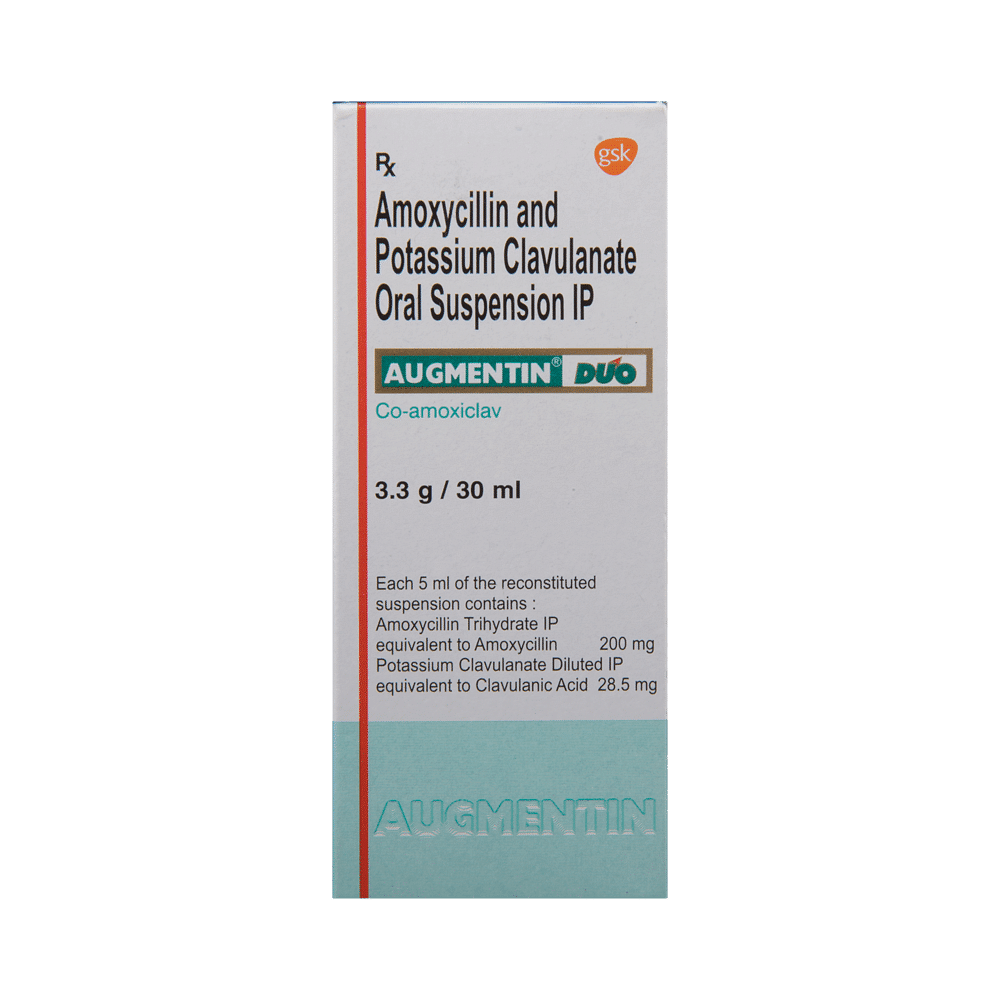
Augmentin Duo Suspension

Ofymox-CV Oral Suspension
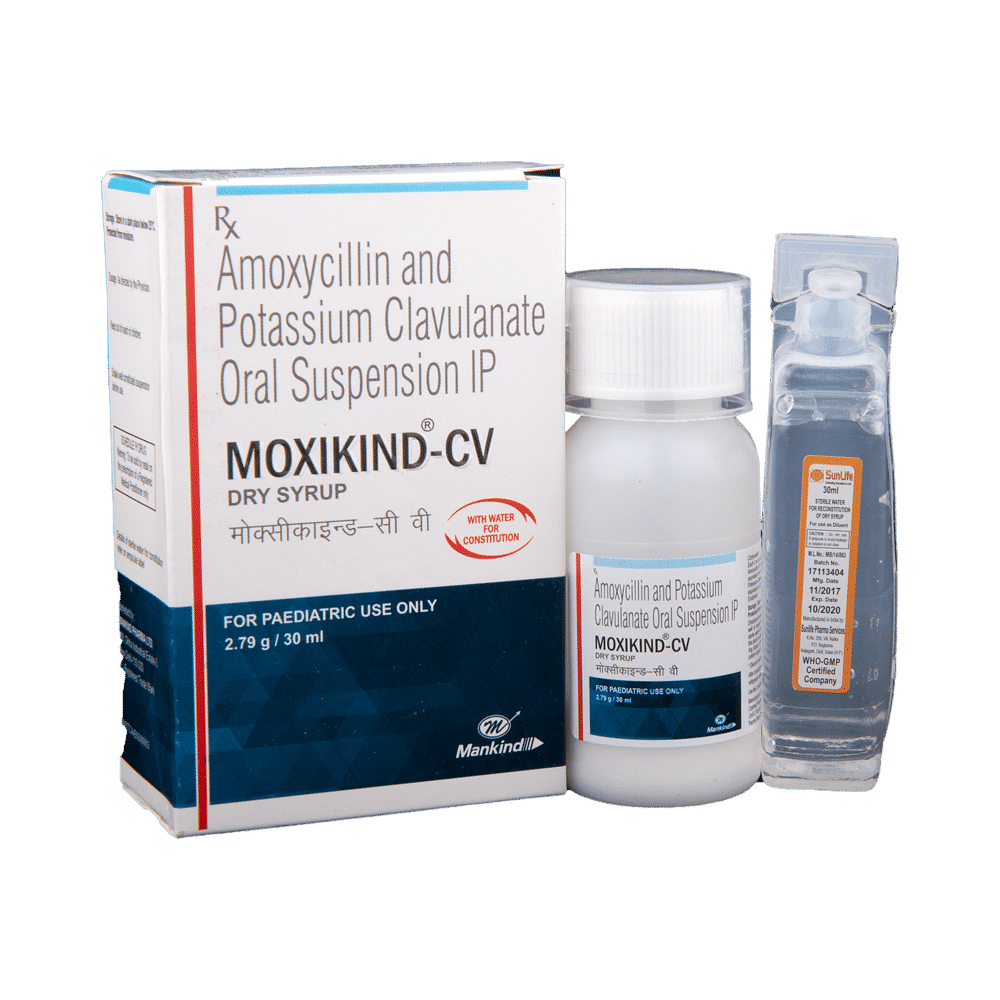
Moxikind-CV Dry Syrup

K-Mox-CV Dry Syrup

Eeclav Dry Syrup

Moxtrio CV Oral Suspension

Pepylav Dry Syrup

Pevimox-CV Dry Syrup

Amoxylav CV Dry Syrup

Segimox-CV 228.5 Dry Syrup
Frequently asked questions
Can other medicines be given at the same time as Bjomox CV 228.5 Dry Syrup?
It is important to inform your child's doctor about any other medications they are currently taking before starting Bjomox CV 228.5 Dry Syrup. Check with your child’s doctor for potential interactions or recommendations.
Can I get my child vaccinated while on treatment with Bjomox CV 228.5 Dry Syrup?
Antibiotics are usually not expected to interfere with the ingredients in vaccines. However, it is crucial for children taking antibiotics to avoid getting vaccinated until they have recovered from any illness. Once your child feels better, the vaccine can be administered.
Which lab tests may my child undergo while taking Bjomox CV 228.5 Dry Syrup on a long-term basis?
Your child's doctor might monitor kidney and liver function tests periodically for prolonged therapy. This helps in assessing the effect of the medication over time.
Can I give a higher than the recommended dose of Bjomox CV 228.5 Dry Syrup to my child?
It is not advisable to give more than the prescribed dosage of this medicine. Overdose can lead to increased side effects and risks. If your child experiences heightened symptoms, please consult with their doctor for an assessment.
Can I stop giving Bjomox CV 228.5 Dry Syrup to my child when the symptoms are relieved?
No, it is crucial not to discontinue this medication unless your child's entire course of treatment has been completed. Symptoms may improve before the infection is fully cleared. Therefore, continue using the medication as per the prescribed schedule.
Can the use of Bjomox CV 228.5 Dry Syrup cause diarrhea?
Yes, Bjomox CV 228.5 Dry Syrup may lead to diarrhea. This is due to its antibacterial nature, which can affect the balance of helpful bacteria in the child's stomach. For example, while it eliminates harmful bacteria, the effect of the medicine on good bacteria in the gut can cause diarrhea. Encourage your child to drink plenty of fluids if they experience diarrhea. If this persists or you notice signs of dehydration (e.g., decreased urination with dark-colored and strong-smelling urine), consult with your doctor.
Do all viral common colds result in secondary bacterial infection?
Most viral infections do not lead to bacterial infections, but it is always best to seek medical advice from your child's doctor. While it is important to note that antibiotics are generally not needed for common colds, they can be prescribed if a severe infection or complications develop.
The mucus coming out of my child’s nose is yellow-green. Is this a sign of a bacterial infection?
Yellow or green nasal discharge in children isn't always an indication of a bacterial infection. The mucus can thicken and change color during a common cold, but it typically lasts for 7-10 days. If you are concerned about your child's condition, please consult with their doctor.
Is there any sign which shows that my child needs immediate medical attention?
Call your child’s doctor immediately if they experience severe allergic reactions (difficulty breathing, skin rashes), gastrointestinal problems (diarrhea, vomiting), or liver damage (pale skin, weakness). While rare, these side effects require expert intervention.


